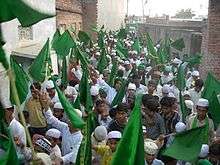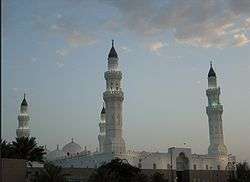Rabi' al-awwal
| Islamic calendar |
|---|
| Months |
Rabīʿ al-Awwal (ربيع الأوّل) is the third month in the Islamic calendar. During this month, many Muslims celebrate Mawlid - the birthday of the Islamic prophet, Muhammad. Although the exact date is unknown,[1][2] Sunni Muslims believe the date of birth of Muhammad to have been on the twelfth of this month, whereas Shi'a Muslims believe him to have been born on the dawn of the seventeenth day. The Prophet himself never celebrated the mawlid, instead encouraged Muslims to fast on Mondays of every week due to his birthday being “on a Monday”. The name Rabī‘ al-awwal means the first [month] or beginning of spring, referring to its position in the pre-Islamic Arabian calendar. Hence this is considered to be a very blessed month.
Meaning
The word "Rabi" means "spring" and Al-awwal means "the first" in Arabic language, so "Rabi' al-awwal" means "The first spring" in Arabic language. The names seems to have to do with the celebration events in the month as "spring" is the end to winter (symbol of sadness) and consequently the start of happiness. The Arabic calendar being lunar calendar, the month is naturally rotating over years and Rabī‘ al-awwal can be in spring or any other season every now and then, so the meaning can not be related to the actual season.[3]
Celebrations

Although historians and scholars disagree on the exact date of Muhammad's birth,[4] it is commonly celebrated on 12th or 17th of Rabi' al-awwal. The celebration of the Mawlid is done differently depending on the country. In some areas celebrations begin as early as the first of the month and can continue till the end of the month. Muslims generally put coloured lights on roads, streets, and their homes and put green flags as well to celebrate. In many countries a procession is also conducted on 12th or 17th of Rabi' al-awwal night and day. On these occasions sweets and drinks are also distributed widely from home to home and to the general public. In some areas Muslims also exchange gifts. It is the month of blessings.
Timing
The Islamic calendar is a lunar calendar, and months begin when the first crescent of a new moon is sighted. Since the Islamic lunar calendar year is 11 to 12 days shorter than the solar year, Rabī‘ al-Awwal migrates throughout the seasons. The estimated start and end dates for Rabī‘ al-Awwal are as follows (based on the Umm Al-Qura calendar of Saudi Arabia[5]):
| AH | First day (CE / AD) | Last day (CE / AD) |
|---|---|---|
| 1437 | 12 December 2015 | 10 January 2016 |
| 1438 | 30 November 2016 | 29 December 2016 |
| 1439 | 19 November 2017 | 18 December 2017 |
| 1440 | 9 November 2018 | 7 December 2018 |
| 1441 | 29 October 2019 | 27 November 2019 |
| 1442 | 18 October 2020 | 15 November 2020 |
| Rabī‘ al-Awwal dates between 2015 and 2020 | ||
Islamic events

- 01 Rabī‘ al-Awwal 897 AH, the fall of the Emirate of Granada, the final Muslim kingdom of al-Andalus
- 08 Rabī‘ al-Awwal, death of Imam Hassan Al-Askari Twelver Imām, Hasan al-‘Askarī (see: Chup Tazia)
- 09 Rabī‘ al-Awwal, Eid e shuja
- 12 Rabī‘ al-Awwal, Sunni Muslims observe Mawlid in commemoration of Muhammad's birthday
- 13 Rabi al-Awwal, Death of Bibi Rubab ( Beloved Wife of Hazrat Imam Hussain alahaysalam)
- 17 Rabī‘ al-Awwal, Muslims celebrate the birthday of the Imām Ja‘far al-Sādiq.
- 18 Rabī‘ al-Awwal, birth of Umm Kulthum bint Ali
- 26 Rabī‘ al-Awwal, death of Abu Talib ibn Abdul Muttalib
- 26 Rabī‘ al-Awwal 1333 AH, death of Khwaja Sirajuddin Naqshbandi, a Naqshbandi Sufi shaykh
Other events:
- The Hijra (migration) took place in this month
- Eid-e-Zahra (a.k.a. Eid e shuja), a celebration of Shi‘ah Muslims
- Marriage of Muhammad to Khadijah bint Khuwaylid
- Building of the Quba Mosque (first mosque in Islam)
- The week including 12th and 17th is called Islamic Unity Week in Iran to address both Sunni and Shia views on the birth date of Prophet Mohammad.[6]
Hadith
- Abu Hurairah said that the Prophet said:
There will be an Ayah (sign) in (the month of) Ramadan. Then, there will 'isabah (splitting into groups) in Shawwal. Then, there will be fighting in (the month of) Dhu al-Qi'dah. Then, the pilgrim will be robbed in (the month of) Dhu al-Hijjah. Then, the prohibitions will be violated in (the month of) al-Muharram. Then, there will be sound in (the month of) Safar, then the tribes will conflict with each other in the two months of Rabi' al-awwal & Rabi' al-thani. Then, the most amazing thing will happen between (the months of) Jumada and Rajab. Then, a well-fed she-camel will be better than a fortress (castle) sheltering a thousand (people).[7]
References
- ↑ Annemarie Schimmel (1994). Deciphering the signs of God: a phenomenological approach to Islam (illustrated ed.). Edinburgh University Press. p. 69.
- ↑ Eliade, Mircea, ed. (1987). The Encyclopedia of religion, Volume 9 (illustrated ed.). Macmillan. p. 292. ISBN 9780029098004.
- ↑ َAl-Monjed dictionary and encyclopedia - the word Rabi' al-awwal
- ↑ What is the Authentic Date of Birth and Death of Prophet Muhammad?
- ↑ Umm Al-Qura calendar of Saudi Arabia
- ↑ Iranian Revolutionary Guards, Institute of Islamic Studies. Days on viewpoint of Imam Khomeini. Tehran: Islamic research center. p. 176.
- ↑ Al-Haakim, Naim ibn Hammad, Kitab Al-Fitan